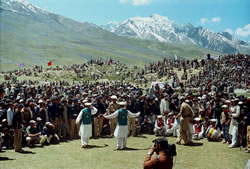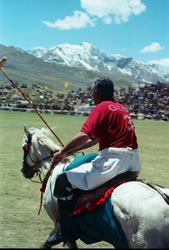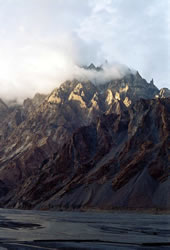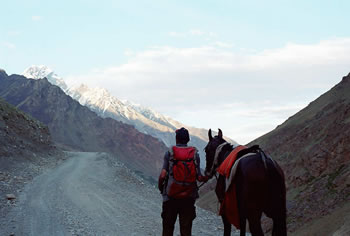Tales from the Mountains

|
Lat:
36:03.960000
Long:
72:30.996000
Tales from the Mountains
14th July 2005
A chapter
closed
This was no longer the thin, amiable horse I had bought in December. Now he was full hot-blooded fallic horse god and a nightmare to control, especially his amorosity. And Griffin? Well this shaggy brute hasn’t really changed much. He’s still as stubborn as a mule although he’s definitely put on a few pounds. He’d be lucky to make it a few kilometres let alone another 2000. The truth was that I’d become attached to both stallions and their outrageous habits. The way Rohan could craftily grasp the lead rope between his teeth to prevent it pulling on his bit when he was taken out. You never really knew when this phallic beast would do next in his futile efforts to get jiggy with the local mare. And then there was the ‘mule’ from Kabul who absolutely hated being ridden. He was certainly a packhorse and a grumpy one at that. Every time he was taken out he would throw a temper tantrum and then just stand there, cemented into the ground. No amount of yanking, kicking or screeching would move this bulldozer. But he did like eating. Yet there was also a quiet intelligence to him you could trust. One more thing, he loved water and would haphazardly slam his front hoof into the dirtiest, scum infested algae ridden water he could find around the back of Brooke’s clinic. Unfortunately, I haven’t had the time to ride both horses and at this point both now needed riding every day for the next four weeks. But in 45 degree temperatures that just isn’t feasible. The dream is over. The horses now sold. One of Brooke’s trustee’s, eventually bought the horses at a good price with the intention of using them for riding in Pakistan Occupied Kashmir (POK) in the future. They are now stabled near Gujranwala, North of Lahore on a farm with acres of available land for riding. The prefect place for two energetic mountain ponies. Chapter closed. Polo in the KarakorumsLiving in Lahore is like living in a pressure cooker and over the past few days I’d fast been approaching boiling point. For months travellers had come and gone speaking about the mystical land of the ‘Northern Areas.’ A land that seemed to have captivated their soul. A land that seemed so far away I thought I’d never get there. But then I did. The Northern Areas (NA) of Pakistan occupy a strategically important part of Pakistan on the borders of China, India and Afghanistan. In fact the area is actually part of the original state of Kashmir ruled by the Maharaja Hari Singh pre-1947. Today that area is divided between India and Pakistan. In Pakistan the original Kashmir includes NA and Azad Kashmir (’Free Kashmir’), which has it’s own governing council. The rest is governed by India in Jammu and Kashmir states. Indians allege that the Maharaja originally signed an agreement ascending the whole area to their country. Pakistan claims differently. Most people in NA are Muslim and actually want to be part of Pakistan, as they have been for 58 years. India has stated that they would accept the current border as an international one but Pakistan has refused. Article: The BBCs indepth look into the Kashmir Conflict The Shandur Polo tournament cum festival is the pinnacle of event of the year in Northern Pakistan. The British originally began it in 1936. One side of the pass (Chitral) plays the other side (Gilgit). Geographically, there couldn’t be a better place for two rivals to compete. Foreigners, locals and Polo players alike gather together on the highest polo ground in the world. Noone actually expected that President Musharaff would turn up. Ashraf Gul is one of the biggest names in Polo and was my contact in Gilgit. Originally a friend of Simone (the Long Rider from Pakistan who saw me off in Delhi. He’s captain of the PWD local Polo team and something of a local hero. After a flurry of emails, Ashraf easily agreed to let me ride one of his Polo horses back from the tournament towards Gilgit. Every year, each Polo player transports his horses by truck part way to the Shandur Pass and then rides them the rest of the way. This is also to acclimatise their steeds. It’s the same on the return. Besides which, this was a great reconnaissance journey. Cities in the Clouds In today’s hyper world, Gilgit and Chitral exist as cities in the sky, remote and secluded from the rest of humanity. Each as different to the other as they are to the rest of Pakistan. Both are so remote that planes can rarely reach them (just try ‘booking’ a ticket). In Winter the only road open to Chitral is via Afghanistan and the road to Gilgit, the Karakorum Highway (KKH) is periodically blocked year round. I couldn’t wait to travel there. The journey to Gilgit was smoother than expected. Well, aside from the tobacco chewing, greb spitting old man next to me. His name was Larden . Despite his guilty looks, his addiction provided no relief to the machine gun fire on the seat in front. In his defense the windows didn’t open too well. The shady leafy lanes of the lower KKH finally gave way to the bare, barren stretches of the upper. Although it was a lovely bus ride it certainly wouldn’t be a road to ride a horse along. Disc jockey drivers pile around ninety degree bends and with a death plunge at your side. you get my point. This journey confirmed all the points I’d been warned about by the Long Riders Guild . Then at 11.30pm we eventually arrived in Gilgit - the mystical land. What is Gilgit? A collection of mountaineering shops and burly Pashtuns? A traditional mountain stronghold slowly adapting to the 21 st Century? There are no ATMs. Where are they? There is little electricity! When is back on? But there is tranquilness and honesty. The town has the bustling pulse of the heart of a civilisation, yet also an edge. An edge that all settlements have when they exist in sheer remoteness. Gilgit is arguably between 16 and 25 hours from Islamabad and that’s on a good day! From its outskirts nothing but meadows roll. It’s perfect. An idyllic drive in the mountains.It was a serene drive from Gilgit up to the 12,000ft (3700m) Shandur pass. Alongside, the Gilgit/ Ghizer rivers roared. Yaks grazed on the uplands and crazed locals hung in tiny boxes on arial runways. As we approached the pass, the mountains opened out and the Shandur ploughed through. An open swathe of grassland in the middle of the Karakorums. The perfect setting for a lonely pilgrim laden with baggage, plodding the high trails a thousand years ago. Yet now it was more like the Shandur town. Our jeep blasted through a melee of afghan traders et al, who’d created a ‘tent city’ that sprawled like a gold rush town above the pitch. Chickens squawked hurriedly out of the way and traders bellowed filled the car as we inched through the bedlam. Of all the places and things I’ve seen, this polo match was one of many. But when I think about it I cannot think of a comparable experience. To a reasonable mind taking 50 horses and six teams on top of a remote mountain pass along with a few thousand people, might sound odd. In Pakistan it’s just part of the natural course. Shandur - An eight hundred year history The rule is there is no rulesThe first polo match was between two local villages just down on either side of the Pass. The players were quick, but the horses were quicker as they thundered down the pitch often over running into a quickly fleeing crowd. The standard of polo was beyond comparison to the game I saw in Delhi, but what a setting!  Both teams played six to a side on horses that had to survive one hour of grueling conflict. It had been decided in the 1930s that the original rules of Ali Sher Khan, a descendant of Genghis Khan would be used. And they certainly are. Imagine. Both teams race towards the ball lying momentarily in the grass. One horse is stronger than the others and sprints out in front, eyes bulging, tongue lathered. His rider hangs off the side, a pure athlete whose world is the ball. Eyes focused, muscles like steel the player arcs his mallet high in the air and brings it forcefully down. He misses, but the player behind doesn’t and the ball rockets into the crowd. The crowd scatters and quickly throws it back onto the pitch. A mass of horse and man then suddenly descend where the ball once was. Players shove, horses collide, arms strain and then mallets snap. One hero looks away as eagle eyed attendants rush a new one out, but he’s too late. The ball flies up the pitch and two players race towards it. Man and horse completely in tune. As they near the ball one jockey grapples with the other pushing him off course and the ball soars through the air to score a goal for the winning side. Polo horses are primarily from the plains of Southern Pakistan and they are each trained by their owned to turn on a penny and stop on one too. As the players finished the first game, the whole crowd rushed onto the pitch, lifting the dazed heroes onto their shoulders and parading around the pitch. In the West football is our passion, but here passion has a new meaning. Now the winning players could go home to their wives, to a hug and a kiss. Whilst the losers go home to be pelted by stone and mud. The police had a field day laughing with fellows one minute, then gaily setting to work beating any innocent civilians who got in their way. After the trophy ceremony and lots of dancing the crowd dispersed into the ‘village’ to grab some food and whatever latest bargains were available. There were mundane items like chickens or luxury ones like TVs. Musicians would randomly strike up a chord and anybody nearby just started dancing. Any excuse for a party. In honesty the next two days went all too quickly. I’d arrived on the Pass with Ashraf’s business partner Rehmat Nabi and a whole mixed bag of foreigners. There was Alex, (the Pakistani looking Aussie whose parents were actually Italian), an Italian lady, a British couple and a half American/Pakistani lady called Elizabeth. A truly excellent cook provided the food and the best thing was it was bloody freezing. On the second day I learnt that both of Ashraf’s horses were injured and wouldn’t be riding anywhere. To top it off, all the local horses had disappeared and my plans seemed to be evaporating with the wind. Yet some horses did remain there was some surprising news. An important guest was apparently coming to town. The dancing PresidentThree enormous army helicopters roared overhead up the valley in a whirl of noise and dust. Horses scattered everywhere and the crowd ducked. It was a scene from Rambo Three. Unfortunately there were no random sneering Russian at the controls. Rather just a top gun pilot as his stately passenger. We’d all suspected something was up on the second day. Two Pakistani army choppers had hovered smack bang over the centre of the polo match while it was in full swing, throwing up a dust storm from the apocalypse, destroying all hope of the players even seeing the ball. The local wise man, (or Police chief as they sometimes call him), had decided to make all foreigners arrive three hours earlier for the tournaments grand finale. Being responsible tourists we arrived thirty minutes before. The surprised guard quickly ushered us to the far side of the pitch where we were ‘kindly’ allowed to keep our cameras. A few thousand spectators now crowded around the pitch, separated by a low stone wall. All eyes were glued to the South where the road wound lazily down across a broad swathe of Pass towards Chitral. The helicopters landed in progression. Therei blades finally slowing for a majestic scene. I wouldn’t be in any other part of the world to see this. The president couldn’t be in a more impressive setting than this. Helicopters paraded in a line to the backing of a silvery lake, intruded only by the snapping jaws of the mountains around. The president’s helicopter was the last to put down as a long line of cards fronted by a white limo arrived to greet him. This may be an open land, but every high point, hillock and grassy knoll around was armed. The blades finally settled and a smartly dressed ensemble gathered at its door. A man dressed in full military regalia could have stepped out. but instead President Musharaff was dressed in slacks, loose shirt and a bright yellow cap that said ‘President’ in bright red writing. Whatever my impression may be though, President Musharaff’s visit was a success. After greeting the dignitaries, he gave a rather incomprehensible speech for an hour on the greatness of his presidency and how he was going to help the NA. Ten years ago, Benazir Bhutto’s was heckled at this tournament. Her polices weren’t popular in the Northern Areas. Fundamentally, this was the Presidendts chance to do better. He promised to waive 10 million Rupees debtto the local famers and in returen asked to peaced and stability in the region. He also promised to begin construction on a tunnel that would connect Chitral to the country year round. Throughout his speech the crowd was prompted to shout ‘Glory to Pakistan, Glory to President Musharaff.’ The final Polo match was the definition of professionalism. Gilgit A team vs. Chitral A team. Every shot was beautifully on target as the ball fired from one end of the pitch to the other. Gilgit was easily the better side and the defending champions Chitral knew it. Chitral was being clobbered at half time 5 - 1. It was time for a new strategy. In the second half there was contention over different playing styles but in the end Gilgit won 11-9. The goofy looking president then decided to act more so by ‘dancing’ at half-time. But then the NA of Pakistan is a fiery place and even given Bhutto’s previous disaster he perhaps gain more credit for trying to fit in. After the trophies had been awarded the crowd quickly dispersed. Tents came down and the remaining Polo players made their horses ready to leave. This was my last chance. I raced to the nearest stand of horses and found the head groom, chatting nearby. He freely agreed to let me ride 50kms down to Phander towards Gilgit. To his credit, Ashraf had asked the owner of those same horses earlier and I’d simply confirmed the arrangement. My big dream to ride one polo horse and escort a second lay in tatters but at least I got a chance to ride the most beautiful section of the return journey. I was fortunate to have good friends. Rehmat took all my baggage and packsaddle back to Gilgit for me on the jeep and I had one amazing experience.  It was unforgettable. My first time riding in the mountains. A ride amidst giants. A land you know that one shouldn’t really be in but actually are. Four horses, riding as specks amongst the in-sweeping slopes of the Karakorum. The grooms, who I accompanied down, were having a tough time at the start. They were trying to control a Badakshi and a Punjabi horse and both were constantly fighting. I constantly had to keep my stallion separate to avoid carnage of bucking hooves and snapping teeth. As the day closed, we were no nearer to Phander. The river was a roaring reminder of the plunge that awaited but we eventually arrived late that same night. Most of the journey had been spent walking with our tired steeds (especially downhill and at night). All of the horses had just completed a full arduous polo match that morning and were already knackered when we left. Summise it to say that the ride was great and I learnt a lot. When I finally arrived in Phander I collapsed in on the veranda of a local hotel and didn’t move till morning. Overall, I met a lot of great people up in Gilgit and made some important contacts at the Pakistan-Chinese border who can assist in transporting my horses across into China. The Karakorum highway was certainly a sight to behold and I can’t wait to ride it’s upper half soon. Leaving dateMonday, 15 th of August is Indian Independence day and the perfect day for a horse ride to China. Until then my hands are tied preparing to leave, buying fresh horses, organising a national publicity campaign, a TV series in Pakistan, sponsorship and the list goes on. The next time I write, it will hopefully be about the first day of a year long journey. Some quotes from across the Internet: “The dance in itself is an elegant display of body maneouvering and twirling shoulders and arms performed by men in white Shalwar Qamees , Red Waistcoats and White Curled Hats.” ( Note : Something President Musharaff wasn’t) http://www.khyber.org/places/2005/Chitral.shtml “The best players have a strong horse, a wrench-like wrist and a backside of rubber. Still, injuries are common. Legs are broken, skulls cracked, and one player died from a heart attack mid-match.” http://www.buzzle.com/editorials/7-6-2005-72731.asp |
 Both horses knew and perhaps I did too. But I didn’t want to accept it.
The fact was that both needed a new home. There was no alternative. Rohan
snorted and tested his lead rope. Pausing mischievously, he then suddenly pulled
away to the right, jerking his lead rope and dragging me head first into a
garden pole and galloped away gleefully to look for the nearest mare.
Both horses knew and perhaps I did too. But I didn’t want to accept it.
The fact was that both needed a new home. There was no alternative. Rohan
snorted and tested his lead rope. Pausing mischievously, he then suddenly pulled
away to the right, jerking his lead rope and dragging me head first into a
garden pole and galloped away gleefully to look for the nearest mare.